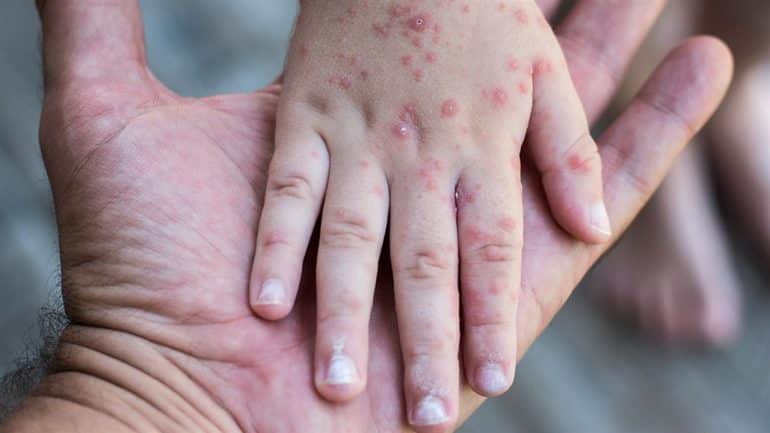An announcement, with information and instructions to the public and travelers about Measles, was issued by the Ministry of Health, following the sharp increase in cases of the disease in Europe.
As stated "Measles is an acute febrile rash disease, highly contagious, caused by the Measles virus. It can be complicated by otitis media, bronchopneumonia, laryngotracheobronchitis, encephalitis and diarrhea. Measles remains one of the leading causes of death among children worldwide.
Epidemiological Image
Measles outbreaks usually occur in late winter and early spring. The disease is more severe in infants and adults, mainly due to complications. Today, the disease affects unvaccinated children and adults, and epidemic outbreaks occur when the proportion of children with the disease increases.
Since June 2023, a steady increase in the number of measles cases has been observed in European countries. Most cases were reported in Romania, United Kingdom, Austria, France, while sporadic cases are recorded in many European countries. In Cyprus, no cases had been recorded in the last two years, while sporadic cases in previous years concerned imported cases. From the beginning of 2024 until today, two positive cases of Measles have been reported and they concern children.
Modes of Transmission
Measles is caused by the measles virus, an RNA virus, belonging to the paramyxovirus group of the genus Morbillivirus. Man is the only receptor of the virus in nature. The disease is transmitted extremely easily in closed spaces under crowded conditions. Transmission occurs by direct contact with infected respiratory secretions or airborne through respiratory droplets spread by an infected person through coughing, breathing or sneezing. Transmission can occur from four days before the appearance of the rash to four days after (the day the rash appears is defined as day 0), when the concentration of the virus in the secretions is very high, and coughing, running and sneezing more intensively. The incubation time of the disease varies from 7 to 21 days (usually it is 10-12 days from exposure to the precursor stage and 14 days from exposure to the appearance of the rash).
Clinical Picture
There are 3 stages of the disease:
- prodromal (catarrhal): lasts 2-4 days, characterized by fever, severe catarrhal symptoms (lacrimation, rhinorrhea, palpitations), cough, conjunctivitis and photophobia.
- rash: lasts 5-6 days and is characterized by the appearance of a macular papular rash.
- stage of decline (recovery): characterized by a drop in fever and gradual disappearance of the rash.
About 30% of measles cases have one or more complications that are more common in children <5 years of age and adults >20 years of age. Also, women who are pregnant and the immunocompromised have an increased risk of severe disease. More serious complications are pneumonia, acute suppurative otitis media and acute encephalitis (1%). Subacute sclerosing panencephalitis (SSPE) is a rare complication and occurs after an average of seven years from the onset of measles.
Transmission Prevention and Control
In Cyprus, vaccination against measles is done with the triple measles-mumps-rubella (MMR) vaccine, which is administered according to the National Immunization Program in two doses: at the age of 12 months (1st dose) and at the age of 4 years (2nd dose) ), but it can be administered earlier, as long as 4 weeks have passed after the 1st dose.
Vaccination is free of charge for all beneficiaries of the NHS and at the Maternity and Child Protection Centers for non-beneficiaries. During epidemic periods MMR vaccination can be given from the age of six months. In this case, they should be revaccinated with two doses of MMR after 12 months of age according to the schedule. Infants aged 6 to 11 months who are going to visit measles-endemic countries are recommended to be vaccinated with one dose of MMR vaccine before departure.
The Ministry of Health, for disease prevention, recommends vaccination with the MMR vaccine in children, adolescents and adults who have not been vaccinated with the necessary doses.
Instructions for travelers
Those who have not been vaccinated in childhood based on the National Immunization Schedule, and are going to travel abroad, are recommended to be vaccinated with the MMR vaccine.
You should contact your doctor as soon as possible in the following cases:
- If you or your child have suspected symptoms consistent with Measles, such as fever and rash. It is also recommended that you inform the doctor of the suspicious symptoms before your visit, so that the necessary arrangements can be made at the appointment, in order to reduce the risk of Measles transmission.
- If you have been in close contact with a person suffering from Measles even if you do not have any symptoms.
